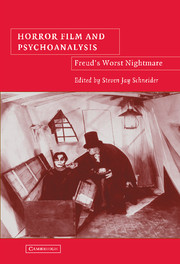Book contents
- Frontmatter
- Contents
- Acknowledgments
- Foreword: “What Lies Beneath?”
- Introduction: “Psychoanalysis in/and/of the Horror Film”
- PART ONE THE QUESTION OF HORROR-PLEASURE
- PART TWO THEORIZING THE UNCANNY
- 5 Explaining the Uncanny in The Double Life of Véronique
- 6 Manifestations of the Literary Double in Modern Horror Cinema
- 7 Heimlich Maneuvres: On a Certain Tendency of Horror and Speculative Cinema
- 8 “It was a dark and stormy night…”: Horror Films and the Problem of Irony
- PART THREE REPRESENTING PSYCHOANALYSIS
- PART FOUR NEW DIRECTIONS
- Afterword: Psychoanalysis and the Horror Film
- About the Contributors
- Bibliography
- Index
7 - Heimlich Maneuvres: On a Certain Tendency of Horror and Speculative Cinema
Published online by Cambridge University Press: 14 July 2009
- Frontmatter
- Contents
- Acknowledgments
- Foreword: “What Lies Beneath?”
- Introduction: “Psychoanalysis in/and/of the Horror Film”
- PART ONE THE QUESTION OF HORROR-PLEASURE
- PART TWO THEORIZING THE UNCANNY
- 5 Explaining the Uncanny in The Double Life of Véronique
- 6 Manifestations of the Literary Double in Modern Horror Cinema
- 7 Heimlich Maneuvres: On a Certain Tendency of Horror and Speculative Cinema
- 8 “It was a dark and stormy night…”: Horror Films and the Problem of Irony
- PART THREE REPRESENTING PSYCHOANALYSIS
- PART FOUR NEW DIRECTIONS
- Afterword: Psychoanalysis and the Horror Film
- About the Contributors
- Bibliography
- Index
Summary
I've seen things you people wouldn't believe – attack ships on fire off the shore of Orion … sea beams glittering in the dark at the Tannhauser Gate … All those moments will be gone in time – like tears in rain …
– Roy Batty (Rutger Hauer) in Blade RunnerThe present volume emerges out of an ongoing, sometimes acrimonious, debate over the viability of psychoanalytic theory to explicate horror and speculative cinema. The doubtfulness of influential critics like Noël Carroll on this score is indicative of a general skepticism about the worthiness of “applied analysis” in cinema and other critical studies, which has escalated over the past decade. One notes that not a few spear-carriers for the current eruption of anti-Freudianism have been former true believers themselves (e.g., Frederick Crews, generalissimo of the famous New York Review of Books “Freud Wars,” who in a previous incarnation authored a workmanlike analytical study of Hawthorne).
The analytic enterprise – notably the idiosyncratic Freudianism of Lacan – dominated film theory for several decades, variably conflated with semiotics, Marxism, feminism, deconstructionism, etc. But even as psychoanalytic practice withers under the lash of managed care, and the Founding Father is everywhere denigrated by clinicians and scholars alike, “Lacanalysis” along with less arcane analytic tactics have lost much of their luster for the Academy. In the quest for genuine relevance or mere tenure, the rubrics of applied analysis have been ditched for archival investigation, or other a la page endeavors.
- Type
- Chapter
- Information
- Horror Film and PsychoanalysisFreud's Worst Nightmare, pp. 122 - 141Publisher: Cambridge University PressPrint publication year: 2004
- 1
- Cited by

